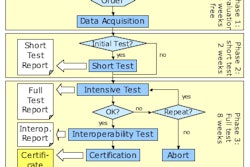
NEW YORK (Reuters Health), Feb 1 - Increasing age, male gender, lower systolic blood pressure, and other factors are associated with increased mortality risk after hospitalization for acute heart failure, according to a report in the December 2006 issue of the European Heart Journal.
Despite the clinical significance of acute heart failure, there are limited data on its epidemiology, treatment, and prognosis, the authors explain.
Dr. Veli-Pekka Harjola from Helsinki University Central Hospital, Finland, and associates used data from the Finnish Acute Heart Failure Study (FINN-AKVA) to investigate the cause, concomitant diseases, treatment modalities, morbidity, mortality, and prognostic markers of acute heart failure.
The most common presentations of acute heart failure were acute congestion (63.5%) and pulmonary edema (26.3%), the researchers report.
Among the two-thirds of patients whose left ventricular ejection fraction was reported, half had preserved systolic function, the results indicate.
In-hospital mortality was 7.1%, the researchers note, and only 58% of patients were discharged directly to home (though 78% had been hospitalized from home). The rest were discharged to regional hospitals or nursing homes for further rehabilitation.
One-year mortality rates were higher in patients with decompensated chronic heart failure (33.5%) than in patients with new (acute) heart failure (21.1%), the investigators say. Mortality rates were highest among patients with right heart failure (43.3%) or cardiogenic shock (35.7%), intermediate in the pulmonary edema group (31.9%) and congestive group (25.1%), and lowest in the hypertensive heart failure group (15.8%).
As noted, age, male gender, and lower systolic blood pressure on admission were independent prognostic factors for mortality, as were C-reactive protein above 10 mg/L, and creatinine above 120 micromol/L.
"Better understanding of acute heart failure may help develop protocols for trials to improve prognosis of patients with acute heart failure," the authors conclude. "Indeed, in contrast to studying acute heart failure as a single entity, more refined trials, which take into account diverse etiologies and manifestations of acute heart failure, are needed."
"To this point," the researchers add, "there is still room for improvement in adherence to diagnostic and therapeutic strategies as described in the recently published guidelines."
Last Updated: 2007-01-31 15:25:07 -0400 (Reuters Health)
Eur Heart J 2006;27:3011-3017.
Related Reading
Mortality after right ventricular infarction drops after first year, January 26, 2007
Copyright © 2007 Reuters Limited. All rights reserved. Republication or redistribution of Reuters content, including by framing or similar means, is expressly prohibited without the prior written consent of Reuters. Reuters shall not be liable for any errors or delays in the content, or for any actions taken in reliance thereon. Reuters and the Reuters sphere logo are registered trademarks and trademarks of the Reuters group of companies around the world.

















